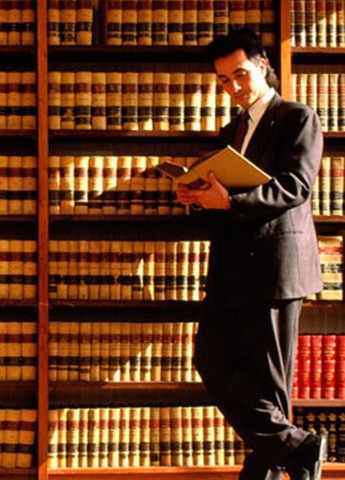
『律师们谨慎地控制着本行业中律师的数量,如此一来,他们便可以推高自己的工资了。』
Barriers to entry in the legal profession:Not enough lawyers?
踏入律师行业障碍重重:真的缺少律师吗?
Sep 3, 2011 | From The Economist

“OVERLAWYERED” is the name of a widely read blog on America’s legal system, and many Americans feel that way. Yet three economists think the country is actually plagued by too few lawyers, not too many. Clifford Winston and Robert Crandall of the Brookings Institution, a think-tank, and Vikram Maheshri of the University of Houston, published a book last month arguing that barriers to entry have kept the number of lawyers artificially low for decades. This—combined with an economy over-regulated by lawyers who go on to politics—results in an unearned premium on legal wages.
Three supply barriers bulk largest. The American Bar Association accredits law schools, and in most states you must be a graduate of one of them to practise law. (California, most notably, lets students practise who have passed the bar without attending law school. Pass rates are a respectable 15%, against 30% for graduates of bar-approved law schools.) The authors note that Abraham Lincoln, who practised for decades, and Clarence Darrow, perhaps the most celebrated criminal defender in American history, did not graduate from law school.
The second hurdle for a would-be lawyer is the bar exam itself. Proponents say it acts as a useful quality control. Opponents say it is a gruelling but useless ritual. In 2005 the dean of Stanford University’s law school, going into private practice, failed it on her first try. So did Benjamin Cardozo, a 1930s Supreme Court justice and prolific scholar, who today has a law school named after him. Today students pay thousands of dollars to study for their bar exams, even after they have finished law school. But even after they pass, the bosses of legal firms note that new hires still need to be taught nearly everything about actual practice on the job.
Finally, American states do not allow non-lawyers to manage or invest in law firms, nor can companies not run by lawyers practise law in any form. Messrs Winston, Crandall and Maheshri think that—in a more sensible world—banks, consultancies, accountancies and others could hire lawyers and offer a full range of services, including legal ones. And those without the bar exam or law school under their belt could still, with training and experience, dispense routine guidance and offer legal services, such as drafting wills and arranging simple divorces, to poorer clients. Doing so today risks getting a false “lawyer” sent to prison.
In 2000 the average American law-firm lawyer made $191,000. Exactly comparable numbers are scarce, but the average salary for all lawyers in Canada in 2002 was just $64,000; in Australia in 2000 it was $90,000. American lawyers are clearly reaping some kind of premium, and the economists behind the Brookings study carefully control for a host of factors including long hours, areas of specialisation, and inherent talent. They reckon that of the $170 billion spent on lawyers every year in America, some $64 billion is a premium produced by market distortions. The economy suffers another $10 billion in annual “deadweight” loss—economic activity stifled or deterred by the cost of the system.
Lawyers promptly filled the American Bar Association’s website with sarcastic comments about the study, musing about extending their practices into surgery and mortgage lending. The Brookings authors acknowledge that the most complex matters will still go to the best-educated and qualified lawyers. But the internet and other tools could allow the average client to survey a much wider range of lawyers’ past work and recommendations.
Quality control is always imperfect; the current qualification system, after all, lets both incompetent and unethical lawyers through. Mr Winston says that oversight would be a much better method than restrictions on supply. Many clever people are bad at taking tests, or are not able to spend $150,000 on law school. The question is whether the tens of billions of dollars being wasted on the current system are an acceptable cost for keeping a few bad lawyers, alongside many decent ones, from offering their wares. (661 words)
特别声明:①凡本网注明稿件来源为"原创"的,转载必须注明"稿件来源:育路网",违者将依法追究责任;
②部分稿件来源于网络,如有侵权,请联系我们沟通解决。
25人觉得有用
24
2011.10
『大学学位不再保证衣食无忧的生活。』 Angst for the educated 为受教育者感到担忧 Sep 3rd......
24
2011.10
『造成边缘型人格障碍的根源是什么?这是一个未解之谜。』 The Mystery of Borderline Personality......
24
2011.10
『电子图书的出现使读者有了更多选择,而图书出版商若想立于不败之地,就必须积极应对电子时代的到来。......
24
2011.10
『电子图书的出现使读者有了更多选择,而图书出版商若想立于不败之地,就必须积极应对电子时代的到来。......
24
2011.10
『昔日的繁荣小城如今被“失业率”打垮,在美国城市曼西,产业工人就业艰难。』 Off-tra......
24
2011.10
『如今,环境恶化如此严重,即使每个人尽其所能为绿色生活做贡献,也是无济于事。』 Going Green b......